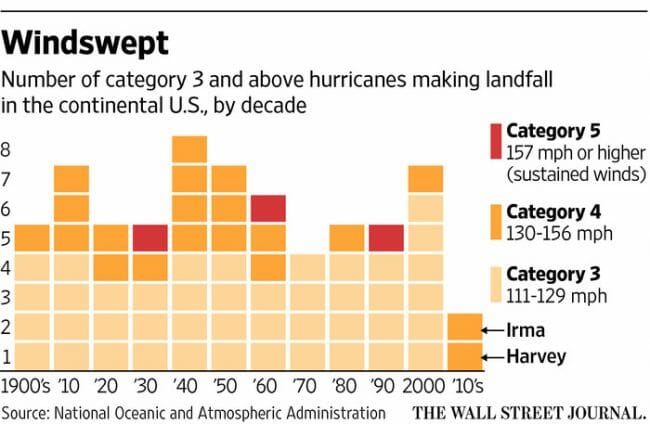Most College-Age Kids Probably Can't Remember A Major Hurricane Landfall
Most folks, even those who say they are data-driven, are not data-driven. They react to their perception. If some sort of activity suddenly makes the news more, we assume that activity is increasing, even if all that is happening is that the activity is simply making the news more.
A lot of the folks who want to blame this year's landfalling hurricanes on global warming are making this mistake. If you are 20, the last major hurricane landfalls were in 2005 when you were 8. The last decade has seen a nearly unprecedented drought in US major hurricane landfalls, so against the backdrop of this drought, several major Atlantic storms seems highly unusual. But I grew up in the 1960's to the 1980's on the Gulf Coast and hurricanes were a regular part of our life then. When I lived in Clear Lake City, Texas, we had so many in a few years in the 1980's that I had a special spot picked out to park my car to keep it above flood waters. In the 1990's, we had a memorable vacation where we rented a house on the North Carolina coast for a month and got hit by three hurricanes -- we spent the whole trip hiding in the laundry room from tornado warnings and evacuating back and forth to the interior of the state.
For those who like simple charts, the WSJ had a good one the other day:
Making this a chart of hurricane landfalls deals with the public perception issue, as landfalls tend to be the only ones we really remember. But this is actually a terrible metric (even though it makes my point about Irma and Harvey not representing any sort of upward trend) because landfalls are random and may not really represent actual hurricane activity. A better metric is accumulated cyclonic energy of tropical storms, which looks at a sort of integral of storm strength over time. This does not show a trend either, but since I cannot find a chart of ACE updated with recent activity I am not going to put it up here. Here it was as of June of this year, and this chart only goes back to 1970 -- if we had good data early in the 20th century it would have been much higher.

Well intentioned, honest people also seem to have poor memories regarding historical events. It was a very, very snowy winter last year where I live, and a number of old timers made comments about how we used to always have snowfall like this. So I looked up after the season ended and it was by far the most snowfall since records began in the '50's and about double the historical average. And furthermore, most of the highest snowfall years have been in the last 10-15 years.
I did some statistical analysis on the probability of two unusual events that have recently happened. We could quibble about the assumptions of random and independent events, but any discussion on that issue should make my point even more dramatic. First, the probability of being hit by two Category 4+ hurricanes in one year is once every 49 years. Given our length of record keeping, we could expect to have recorded that occurrence 3 times. (BTW, in its history Mexico has been hit by two Category 5 hurricanes in one year. One from the Pacific side and one from the Atlantic side.) Meanwhile, the probability of going 11 years without being hit by a Major Hurricane is once every 540 years. That is extremely rare, and I do not expect to see it again in my lifetime!
Of course, mainstream media is all aghast at higher probability actually happening, meanwhile virtually ignoring the rarest of hurricane events.